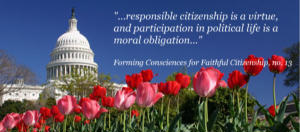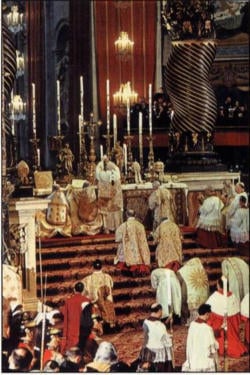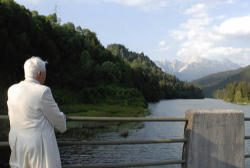 Last week Pope Benedict XVI received the credential letters of six new ambassadors to the Holy See. He sounded a theme which is common in his locutions and writings; he spoke of a “Human Ecology”. He recalled the “innumerable tragedies that have affected nature, technology, and the peoples” this year. He suggested that “the States should reflect together on the short term future of the planet, on our responsibilities regarding our life and technology”.
Last week Pope Benedict XVI received the credential letters of six new ambassadors to the Holy See. He sounded a theme which is common in his locutions and writings; he spoke of a “Human Ecology”. He recalled the “innumerable tragedies that have affected nature, technology, and the peoples” this year. He suggested that “the States should reflect together on the short term future of the planet, on our responsibilities regarding our life and technology”.
He said “Human ecology” is an imperative. Adopting a lifestyle that respects our environment and supports the research and use of clean energies that preserve the patrimony of creation and that are safe for human beings should be given political and economic priority”. He called for a “change in mentality” in order to “quickly arrive at a global lifestyle that respects the covenant between humanity and nature, without which the human family risks disappearing.” He said that “every government must commit themselves to protecting nature and assisting it to carry out its essential role in the survival of humanity.”
Then, he addressed technology saying, “It is also helpful to ask ourselves about the appropriate role of technology” because “believing it is the exclusive agent of progress or happiness carries a reification of humanity that leads to blindness and misery. … Technology that dominates human beings deprives them of their humanity. The pride that it generates has created an impossible economism in our societies as well as a hedonism that subjectively and selfishly regulates behavior. The debilitation of the primacy of the human person provokes a loss of the meaning of life”.
The Pope noted “it is urgent that we match technology with a strong ethical dimension. … Technology should help nature develop along the lines envisioned by the Creator. In working together, the researcher and the scientist adhere to God’s plan that desired humanity as the apex and the administrator of creation. Solutions based on this principle will protect human life and its vulnerability, as well as the rights of the present and future generations”.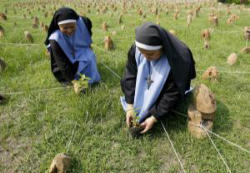
There is nothing new in these words. They comport with what this Pope has written and said since assuming office. However, some Press reports focused on his encouragement of “clean energy”. In some instances the reports implied the Pope had somehow joined the Green movement. I thought back to 2009 when Pope Benedict XVI sent a letter to participants in the World Day of Peace entitled “If You Want to Cultivate Peace, protect creation.” In fact he referred to this letter in his address Thursday.
In that 2009 letter he also used the term “human ecology” and said similar things. Reuters report bore the headline “Pope Goes Green”. The Pope simply reaffirmed the Catholic understanding of our relationship with the goods of the earth and our call to stewardship of the planet which has been given to us by the Creator as a gift. Here are some salient excerpts from that 2009 letter:
“There exists a certain reciprocity: as we care for creation, we realize that God, through creation, cares for us. On the other hand, a correct understanding of the relationship between man and the environment will not end by absolutizing nature or by considering it more important than the human person. If the Church’s magisterium expresses grave misgivings about notions of the environment inspired by ecocentrism and biocentrism, it is because such notions eliminate the difference of identity and worth between the human person and other living things.
“In the name of a supposedly egalitarian vision of the “dignity” of all living creatures, such notions end up abolishing the distinctiveness and superior role of human beings. They also open the way to a new pantheism tinged with neo-paganism, which would see the source of man’s salvation in nature alone, understood in purely naturalistic terms.”
Receiving the created order as a gift with accompanying responsibilities is a part of what is called Catholic Social teaching. The Pope called for an “integral human development” which recognizes the centrality of the human person and the primacy of our relationships with one another in family and society.
The Pope underscored the truth that creation is a gift, given to human persons by a God of love who entrusts us with responsibility for one another – and therefore for the goods which promote our human flourishing. We all have a responsibility for one another. We need to live together as good stewards of creation, recognizing the need first for a “human ecology”.
Here is another excerpt from the 2009 letter: “The Church has a responsibility towards creation, and she considers it her duty to exercise that responsibility in public life, in order to protect earth, water and air as gifts of God the Creator meant for everyone, and above all to save mankind from the danger of self-destruction. The degradation of nature is closely linked to the cultural models shaping human coexistence: consequently, when ‘human ecology’ is respected within society, environmental ecology also benefits”.
“Young people cannot be asked to respect the environment if they are not helped, within families and society as a whole, to respect themselves. The book of nature is one and indivisible; it includes not only the environment but also individual, family and social ethics. Our duties towards the environment flow from our duties towards the person, considered both individually and in relation to others.
“Hence I readily encourage efforts to promote a greater sense of ecological responsibility which, as I indicated in my Encyclical “Caritas in Veritate,” would safeguard an authentic “human ecology” and thus forcefully reaffirm the inviolability of human life at every stage and in every condition, the dignity of the person and the unique mission of the family, where one is trained in love of neighbor and respect for nature. There is a need to safeguard the human patrimony of society. This patrimony of values originates in and is part of the natural moral law, which is the foundation of respect for the human person and creation.”
What Pope Benedict has done is articulate a Catholic Christian Environmental vision which is fundamentally relational. We are to receive one another as gifts. We must never use human persons as objects. We should receive creation as a gift, our common home, to be shared with one another, and not as an object of use.
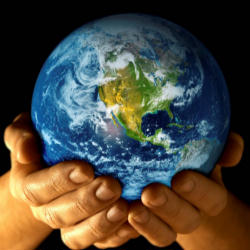 He concluded that 2009 letter with these words, “The Church, for her part, is concerned that the question be approached in a balanced way, with respect for the “grammar” which the Creator has inscribed in his handiwork by giving man the role of a steward and administrator with responsibility over creation, a role which man must certainly not abuse, but also one which he may not abdicate. In the same way, the opposite position, which would absolutize technology and human power, results in a grave assault not only on nature, but also on human dignity itself.
He concluded that 2009 letter with these words, “The Church, for her part, is concerned that the question be approached in a balanced way, with respect for the “grammar” which the Creator has inscribed in his handiwork by giving man the role of a steward and administrator with responsibility over creation, a role which man must certainly not abuse, but also one which he may not abdicate. In the same way, the opposite position, which would absolutize technology and human power, results in a grave assault not only on nature, but also on human dignity itself.
“If you want to cultivate peace, protect creation. The quest for peace by people of good will surely would become easier if all acknowledge the indivisible relationship between God, human beings and the whole of creation. In the light of divine Revelation and in fidelity to the Church’s Tradition, Christians have their own contribution to make. They contemplate the cosmos and its marvels in light of the creative work of the Father and the redemptive work of Christ, who by his death and resurrection has reconciled with God “all things, whether on earth or in heaven” (Col 1:20). Christ, crucified and risen, has bestowed his Spirit of holiness upon mankind, to guide the course of history in anticipation of that day when, with the glorious return of the Savior, there will be “new heavens and a new earth” (2 Pet 3:13), in which justice and peace will dwell forever.
“Protecting the natural environment in order to build a world of peace is thus a duty incumbent upon each and all. It is an urgent challenge, one to be faced with renewed and concerted commitment; it is also a providential opportunity to hand down to coming generations the prospect of a better future for all. May this be clear to world leaders and to those at every level who are concerned for the future of humanity: the protection of creation and peacemaking are profoundly linked! For this reason, I invite all believers to raise a fervent prayer to God, the all-powerful Creator and the Father of mercies, so that all men and women may take to heart the urgent appeal: If you want to cultivate peace, protect creation”
Some in the modern “green” movement have lost their way. It is obvious. Think about the inherent contradiction of worrying about polluting the atmosphere with toxic chemicals and at the same time supporting making toxic chemicals available to be ingested by mothers in order to kill the children in their womb because they do not want them. We need to articulate a new way of being “green”, the Catholic way. That is why Pope Benedict’s calls for a human ecology is so important.
